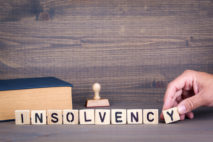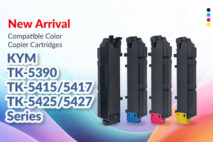It is almost the fourth of July. It is finally summer. Most of you are probably thinking about heading to the beach or pool, family cookouts, and other fun seasonal activities. The last thing you or I want to think about is U.S. law pertaining to patent exhaustion. Because that sounds just exhausting, doesn’t it?
Well, I hate to be the one to disturb your holiday reveries, but there has been huge news that has the potential to change U.S. patent law affecting the remanufacturing industry.
Last week, Lexmark’s toner cartridge lawsuit in U.S. District Court for the Southern District of Ohio came to an end (see “Lexmark Lawsuit in Ohio Comes to an End, Appeals Likely”). Shortly thereafter both Lexmark and Impression Products filed appeals before the U.S. Court of Appeals for the Federal Circuit. This court has jurisdiction in various areas, including patent case appeals. If you are a remanufacturer doing business in the United States, these appeals will be important to follow, as each may have a dramatic impact on your business.
While I don’t have copies of the appeals yet (look for more detailed coverage when I do), what each party would appeal was spelled out as the district court complaint in Ohio wound down.
Lexmark’s Appeal
Lexmark is presumably appealing the judge’s decision to enter a judgment in favor of Impression Products with respect to the firm’s remanufacturing of Return Program (aka Prebate) cartridges first sold in the United States, as well as the court’s March 27 order dismissing Lexmark’s claims related to Return Program cartridges because the program is “invalid under patent law“ (see “Impressions Products Wins One, Loses One Motion to Dismiss Lexmark Lawsuit”).
The 2009 ruling issued by Judge Gregory F. Van Tatenhove of the Eastern District of Kentucky in Lexmark v. Static Control Components is credited with opening up Return Program cartridges for remanufacturing. Judge Michael R. Barrett’s decision regarding Return Program cartridges in Lexmark v. Ink Technologies Printer Supplies et al. relied upon that decision.
If the Federal Circuit were to rule against Lexmark and uphold Judge Barrett’s decision, that would be big news. Unlike other appeals courts, which have jurisdiction in certain regions, the Federal Circuit’s decisions on patent law are binding precedent throughout the United States. So if the Federal Circuit rules against Lexmark, it would be established throughout the United States that the act of remanufacturing a Return Program core originally sold in the United States does not constitute patent infringement. (That is unless Lexmark appeals this issue to the Supreme Court, which seems to be something Lexmark would do.)
However, a win for Lexmark would bring us all back to a pre-2009 world. Lexmark could and presumably would file suit against those who remanufacture Return Program cartridges. The already tough business of remanufacturing Lexmark cartridges would get far more challenging and expensive, as remanufacturers would have to compete for the smaller pool of standard (non-Return Program) empties. Although Lexmark’s standard cartridges are not sold with the agreement that they buyer will return the cartridge to the OEM, empty standard cartridges are not plentiful for a simple reason—Lexmark sells fewer of these cartridges because they are priced so much higher than Return Program cartridges.
Impression Products’ Appeal
Impression Products’ appeal is presumably aimed at overturning the Federal Circuit’s ruling in Jazz Photo Corporation v. International Trade Commission. The Federal Circuit concluded in its Jazz Photo decision that sales of products outside the United States do not exhaust U.S. patent rights. In 2013, however, the Supreme Court issued its decision in Kirtsaeng v. John Wiley and Sons, finding that copyrights are exhausted on any authorized sale, wherever the sale is made (see “Seismic Shift Underway: Supreme Court Case Likely to Significantly Change Supplies Industry”). Many thought this would have an immediate and similar effect on patent law, but this did not come to pass. In fact, the Supreme Court declined to take up a case on the territoriality requirement of patent exhaustion when it decided not to hear Ninestar’s appeal of the fine levied by the U.S. ITC (see “Fat Lady Has Sung for Ninestar: Supreme Court Won’t Review Appeals Court Decision on ITC Fine”).
Undaunted, Impression Products filed a motion to dismiss Lexmark’s patent-infringement claims against it in the Southern District of Ohio. Impression Products argued that Lexmark’s claims against it and the other defendants relied solely on Federal Circuit’s ruling in the Jazz Photo case, a ruling that the company claimed should be overturned in the wake of the Supreme Court’s decision in the Kirtsaeng case.
On March 27, the same day that Judge Barrett found in Impression Products’ favor on the Return Program issue, the judge denied Impression Products’ motion to dismiss related to Jazz Photo. Judge Barrett ultimately issued a final judgment against Impression Products on the patent-infringement claims with respect to remanufactured cartridges using cores sourced from outside the United States.
Even more so than Lexmark’s appeal, Impression Products’ appeal has the potential to drastically change the remanufacturing industry in the United States. The requirement under U.S. patent law that remanufacturers selling product in the United States use cores first sold in the United States is a burdensome and expensive one. Should the Federal Circuit find against Impression Products, then the status quo would be preserved. But if the Federal Circuit finds in Impression Products’ favor and overturns its previous Jazz Photo decision, that would be excellent news for the remanufacturing industry and bad news for OEMs. Remanufacturers could source their cores anywhere in the world, which would make it less expensive to bring to market remanufactured cartridges in the United States. Empties are one of remanufacturers’ biggest fixed costs and without obtaining an adequate number of empties to remanufacture, remanufacturers simply cannot offer certain SKUs. Being allowed to obtain cores from anywhere in the world without risking a patent-infringement lawsuit would lessen these pressures on firms selling remanufactured cartridges in the United States.
I hope to bring you more on these appeals in the weeks ahead. Until then, I hope you all enjoy spending time with friends and family over the Fourth of July weekend. Take my advice, and do not bore your loved ones by talking about patent exhaustion—I have tried it and it goes over like a lead balloon. Do, however, keep in mind U.S. patent law and how it may change when you are back in the office. The supplies industry may be seeing some big changes ahead.







1 Comment
I believe that Lexmark’s appeal has no chance in Federal Court, since the key element is the Prebate contract, and contract law is state law, not federal law. Their only valid claim is against their own customers for failing to return Prebate cartridges to Lexmark and allowing them into the empties stream, thus breaching the terms of the contract.
I remain convinced that the Federal Courts will at some point overturn Jazz Photo. I believe the failure of the Supreme Court to do so resulted from the fact that the Ninestar case was tainted by many other issues. However, it does not necessarily follow from copyright law that patent law must be aligned with it. Copyright law was created in the US Congress and the Jazz Photo aspect of patent law is, of course, case law. Some think the courts are not as likely to change law made in the court system.